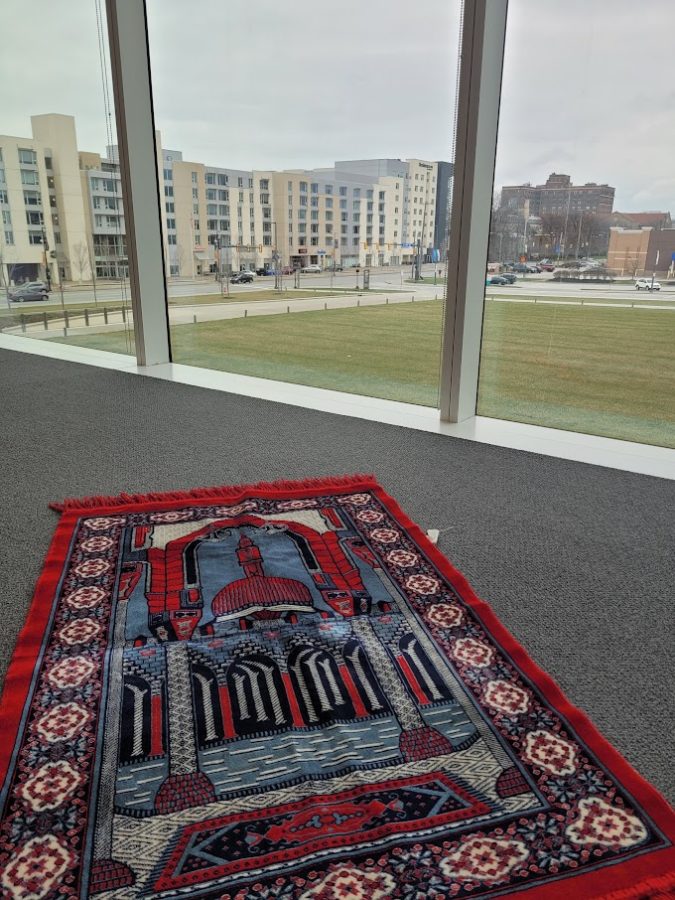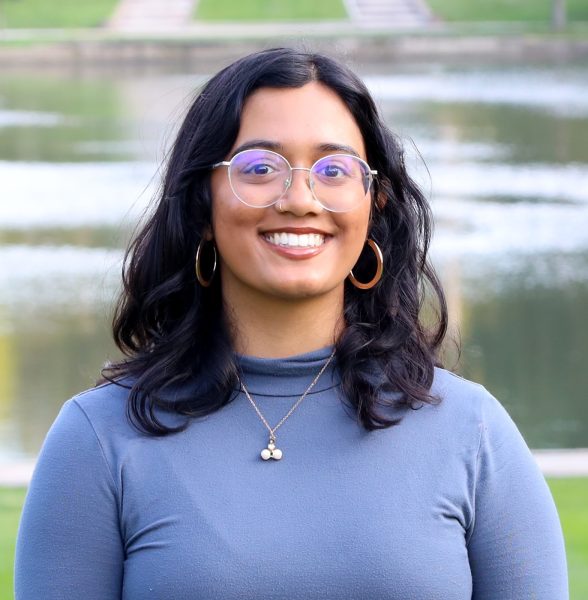A guide to Ramadan for non-Muslims
Muslim students who pray in the Samson Pavilion get to experience a beautiful view of the surrounding Cleveland area.
April 8, 2022
On April 2, Muslims worldwide began celebrating the holy month of Ramadan, the ninth month in the Islamic calendar. For 30 days, Muslims abstain from eating and drinking—not even water—from sunrise to sunset. It’s a time to strengthen our faith and character by practicing self-discipline, focusing on our worship and expressing gratefulness and compassion for our communities.
This Ramadan is particularly unique for me and many other first-year Case Western Reserve University Muslims. Growing up, my Ramadans were always filled with warm memories—memories of chaotic nightly feasts with families and friends as we broke our fasts together and the late nights fighting to keep my eyes open in the mosque. This year will be the first year that I’m spending this meaningful month away from my family, and I’ll admit, it’s a bit terrifying.
Back at home, I never had to worry about finding food for iftar (the meal to break my fast), but Leutner’s signature offering on April 2 was pork, which I obviously could not have. Having to prepare food at 5 a.m. in my little Smith dorm room without waking up my roommate has been a struggle, and don’t get me started on all the walking all over campus on an empty stomach. But amidst the challenges, most things have been incredibly exciting—the iftars that I’ve spent with my Muslim friends here at CWRU, the beautiful view in the Samson Pavilion that I enjoy while praying and the refreshing feeling of my first sip of water after breaking my fast.
Ramadan at college is new for so many Muslims and it may very well be something many non-Muslims have never encountered before. CWRU students come from diverse backgrounds, so I wouldn’t be surprised if this was the first time that many non-Muslims have friends celebrating Ramadan. If you’re looking for ways to support a Muslim friend this month or simply want to understand what to do or what not to do during Ramadan, fear not. Here are a few things to keep in mind to make the most out of this Ramadan.
- You don’t have to be an expert on Ramadan.
It’s okay to offer your Muslim friend a piece of gum if you forget they’re fasting. It’s okay to drink water or eat food in front of us. And while I don’t speak for everyone, the “not even water?!” disbelief non-Muslims experience is amusing to me. For the most part, no innocuous comment will be perceived as insensitive or offensive as long as it is said without ill intent. In fact, many Muslims light up when asked something about Ramadan. We welcome genuine curiosity in our religion and lifestyle—it’s something we’re proud of.
- Avoid asking a Muslim why they aren’t fasting.
One area to be cautious of, however, is asking questions when you see a Muslim not fasting. The elders and young children, along with those who are ill, menstruating, breastfeeding or pregnant, are all exempt from fasting. Even outside those factors, some people feel uncomfortable explaining the reason they are not fasting. Some people are still coming back to Islam, and it takes them longer to adjust to this pillar after years without practicing. Others are experiencing hardships and hidden illnesses; it’s not our place to question it. Regardless of their reason for not fasting, it’s safest to avoid discussing it unless they bring it up.
- Don’t feel obligated to cancel plans.
Ramadan is a time for personal and spiritual growth, and the great thing about it is that it’s different for everyone. Each individual has the ability to figure out how much time they need to dedicate to themselves and how much time they can spend with others. Lunch and coffee breaks are still lovely ideas; we just won’t be able to eat or drink during them. This may be a bit masochistic, but you’ll still find me working in Dunkin’ because that’s my go-to workplace, even if the scents of donuts and coffee are awfully tempting. Just know not everyone will be the same, and some will definitely enjoy time alone more.
- At the same time, expect your Muslim friends to be tired often.
My sleep schedule has never been the greatest, but this month it’s been a bit more chaotic than usual. Waking up at 5 a.m. for a pre-fasting meal (suhoor) and the morning prayer (Fajr) is not ideal for night owls, which most CWRU students probably are. Many Muslims will take naps during the day, but without coffee or food to fuel our systems it’s hard to stay awake during late classes. So, I apologize in advance to my friends for when I inevitably fall asleep during our conversations.
- Enjoy the Ramadan atmosphere while it’s still here!
Ramadan is an exciting time for Muslims, but you can enjoy it as well! Many Muslims appreciate the opportunity to have iftar with their non-Muslim friends; it’s an enjoyable and rewarding meal. Iftar foods vary from culture to culture, and you may get to experience a variety of cultural dishes from Egyptian mahshi to Bangladeshi piyaju. It may be exciting to sit in on a prayer, or even participate in the festivities of Eid-al-Fitr, the day of celebration after the month of Ramadan is over.
Ramadan in college looks completely different from what it is at home and it’ll be a bit of a shift. But even if Ramadan doesn’t look the same, I am confident we can (inshallah) enjoy it just as much in this new setting.



